Gender and Inclusion
Gender, age, abilities and other individual or context-specific characteristics present different opportunities and challenges to provide CVA to people in crisis in a dignified manner.
Among humanitarian actors, there is an increasing acknowledgement of the specific needs and constraints of people of differing abilities, older people, people of different genders, particularly women, and people on the move. Alongside this is a growing appreciation of the need for tailored and sensitive measures that ensure their effective inclusion.
Supporting the needs of diverse people with CVA goes beyond making them a target group; it is about meaningful engagement, purposive design and implementation, and programme adjustment to meet different groups’ needs with dignity. Inclusive approaches go hand in hand with people-centred aid.
Current priorities
The CALP Network will continue to encourage cash actors to widen their focus to be more inclusive and champion a fuller understanding of how CVA can go beyond the notion of ‘do no harm’ towards appropriately addressing the needs of diverse people in safe and dignified manners.
We will work to elevate the experiences and initiatives on CVA and gender, disability inclusive CVA, working with different ethnicities and cultural identities, minority groups, people with diverse sexual identities, and age groups.
CALP will also strive to make its work as accessible as possible.
Featured content

Collected Papers on Gender and Cash Transfer Programmes in Humanitarian Contexts
Report
Existing gender inequalities mean that disasters and conflicts impact women, men, girls and boys differently. Cash based assistance is one of the most significant developments in humanitarian assistance in recent years. But the relationship between gender and cash based assistance in humanitarian contexts is poorly understood. All too often, interventions are designed based on assumptions...

Microlearning video: CVA and Gender
Blog Post
This video provides an overview of the relationship between gender and cash and voucher assistance (CVA) structured around the humanitarian project cycle, which include: Assessment and response analysis: How to adjust the assessment processes to achieve a more accurate reflection of gender and markets. Design and implementation: How to use methods and protocols to reduce the potential...

Better Gender Outcomes in Food Assistance through Complementary and Multi-Modal Programing: Promising Practices Tip Sheet
Guidelines and Tools
This Tip Sheet is excerpted from the research report, “Better Gender Outcomes in Food Assistance through Complementary and Multi-Modal programming,” and gives promising practices by the cycles of project cycle management, as well as at the response level. Additionally, there are expert tips and wisdom practices that support the use of a gendered approach in development or humanitarian...

Cash & Voucher Assistance and Gender-Based Violence Compendium
Guidelines and Tools
The Compendium is intended as a companion to the 2015 Inter-Agency Standing Committee (IASC) Guidelines for Integrating Gender-Based Violence Interventions in Humanitarian Action and its companion resource, the GBV Pocket Guide. The guidance was developed through the efforts of 15 organizations who contributed expertise in the inception, design and review of the document. The process was led...
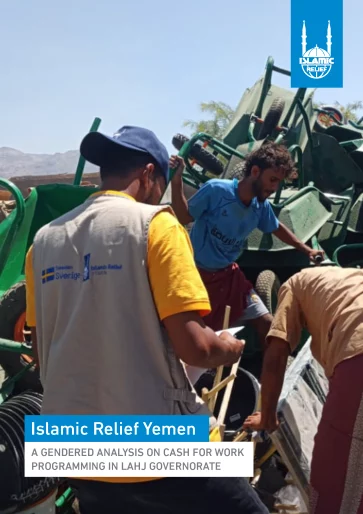
A Gendered Analysis on Cash for Work Programming in Lahj Governorate
Case Study
Cash for Work (CFW) programmes are designed to help the most vulnerable people meet their essential and basic needs. In Yemen, CFW interventions are responding to an ever-growing proportion of the Yemeni population that are in need of humanitarian assistance. Working with communities in the targeted areas of Hudayda and Lahj, the Swedish International Development Cooperation Agency SIDA-funded...
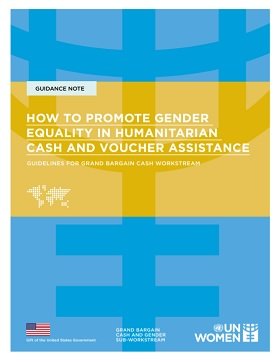
How to Promote Gender Equality in Humanitarian Cash and Voucher Assistance
Guidelines and Tools
The use of cash and voucher assistance (CVA) in humanitarian action is increasing rapidly.
With this rise, there is also growing demand by stakeholders to ensure CVA is more gender-responsive, addressing gender gaps and moving towards greater gender equality.
Gender-responsive CVA, which recognizes existing disparities and addresses the needs of all crisis-affected people equally, has the...
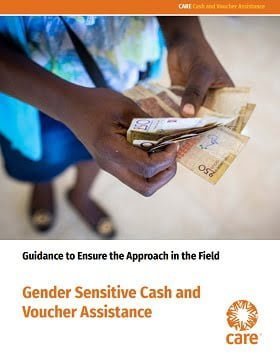
Gender-Sensitive Cash and Voucher Assistance: Guidance to ensure the approach in the field
Guidelines and Tools
This guidance builds on CARE’s ambition-via practice, research, evidence on CVA–and aims to support the application of gender sensitive CVA throughout the project cycle and at the response level. It is divided into two sections: – Part A: ‘What has been learned about gender sensitive CVA?,’ briefly explains the recommendations that came from the research. – Part B: ‘How do we...

Enablers and Gaps: Gender Equality, Gender-Based Violence Response and Mitigation in Cash and Voucher Assistance at Response levels: analysis on three case studies
Report
The Gender and Cash Sub-Workstream identified three case studies that illustrate how Cash Working Groups, GBV Sub-Clusters, gender focal points (e.g. Gender in Humanitarian Action Working groups at country and regional level) and humanitarian partnerships can enable meaningful and wider engagement on gender equity and GBV response in CVA. The case studies all show different aspects of linking...

How to mitigate gender-based violence (GBV) risks in cash and voucher assistance (CVA)
Video
Cash and voucher assistance (CVA) is an important tool to help individuals affected by crises get back on their feet. But just like any other form of assistance, it is vital to ensure that it does not fuel tensions in the household or in the community and that it does not create new risks for women and girls. Fortunately, there are a variety of ways that cash actors can work to mitigate risks...

Inclusive Information Systems for Social Protection: Intentionally Integrating Gender and Disability
Policy paper
Digital information systems serving the social protection sector, and especially social assistance, are increasingly prominent and will continue to be, as is the case within all other sectors. “Why? Because the ability of a country to care for its people and respond to their lifecycle needs depends on its ability to identify those who are in need, enroll them, provide tailored benefits and...
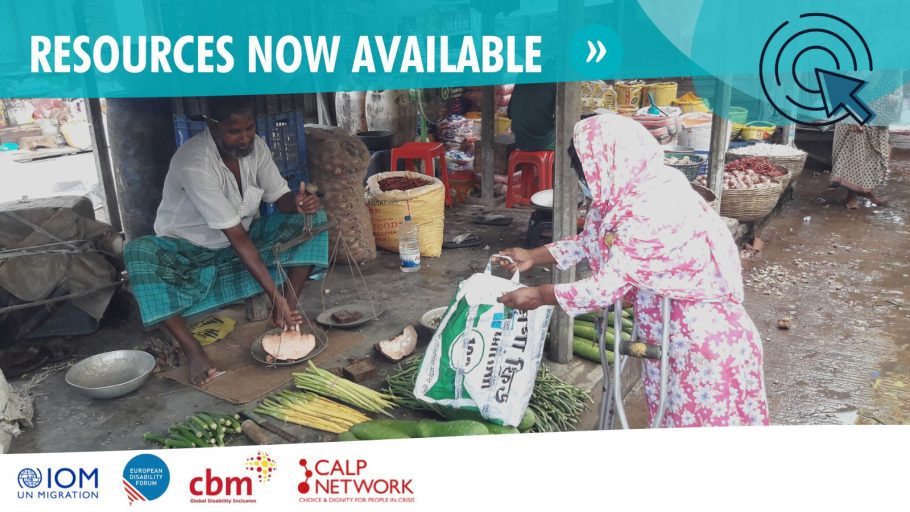
Mainstreaming disability inclusion into humanitarian CVA
Presentation
What is a rights-based approach to disability? How can disability inclusion be mainstreamed to ensure more inclusive and effective CVA humanitarian responses? To answer these key questions, CALP, CBM Global, European Disability Forum and International Organization for Migration (IOM), came together to organize the webinar “Mainstreaming disability inclusion into humanitarian CVA”, with the...
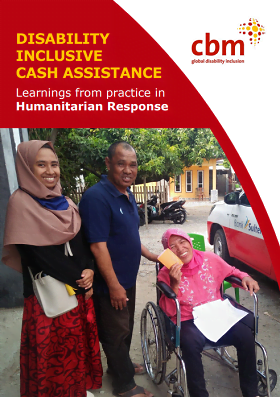
Disability Inclusive Cash Assistance: Learnings from Practice in Humanitarian Response
Guidelines and Tools
This case study collection describes lessons learned from seven inclusive humanitarian cash transfer projects implemented from 2015 – 2020 in Niger, Zimbabwe, Pakistan, Bangladesh, Philippines, and Indonesia, and five ongoing projects from the 2020 Covid-19 pandemic responses. This good practice collection aims to benefit both humanitarian practitioners engaged in Cash Based Interventions...
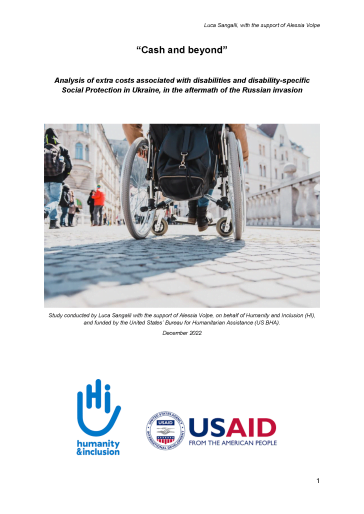
Cash and beyond – Analysis of extra costs associated with disabilities and disability-specific social protection in Ukraine, in the aftermath of the Russian invasion
Report
Following the escalation of the conflict in Ukraine in February 2022 and the consequent humanitarian crisis, the country has experienced active fighting and massive displacement, both within and outside its borders. Persons with disabilities and older persons have been facing particularly harsh effects, especially for those with more severe forms of disabilities, who encountered challenges in...
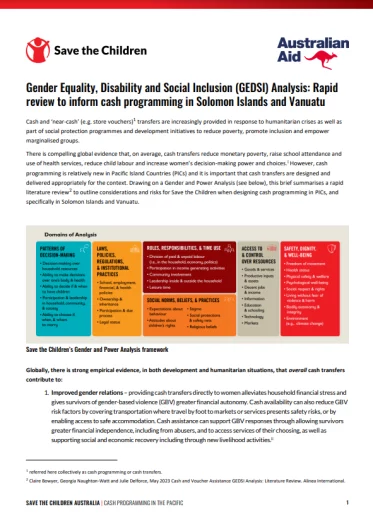
Gender Equality, Disability and Social Inclusion (GEDSI) Analysis: Rapid review to inform cash programming in Solomon Islands and Vanuatu
Report
There is compelling global evidence that, on average, cash transfers reduce monetary poverty, raise school attendance and use of health services, reduce child labour and increase women’s decision-making power and choices. Cash programming though, is relatively new in Pacific Island Countries (PICs) and it is important that cash transfers are designed and delivered appropriately for the...
Thematic lead
Latest
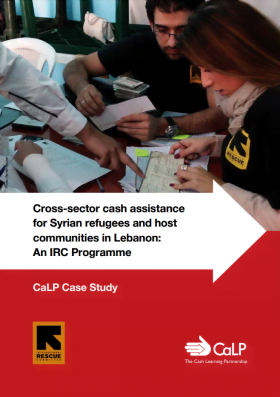
Cross-Sector Cash Assistance for Syrian Refugees and Host Communities in Lebanon: An IRC Programme
Report
Since January 2013, the International Rescue Committee (IRC) has been implementing a project providing humanitarian assistance to the Syrian refugees in Lebanon. This project provided unconditional financial assistance to targeted Syrian refugees and Lebanese host households to help them be better...

Women’s Empowerment and Nutrition
Report
Research on the relationship between women’s empowerment and nutrition, particularly child nutrition, is continually expanding. As part of the quest to achieve gender equality, women’s empowerment has
increasingly been the focus of many development interventions. In addition to being an end goal in...

Cash Emergency Preparedness (CEP) Assessment: Myanmar
Policy paper
Cash transfer programming (CTP) in emergencies is not new in Myanmar, with the first examples going back at least to Cyclone Nargis in 2009. CTP has also been used in humanitarian settings such as Kachin State. However, CTP is not yet being widely used for the current conflict context in Rakhine State due...
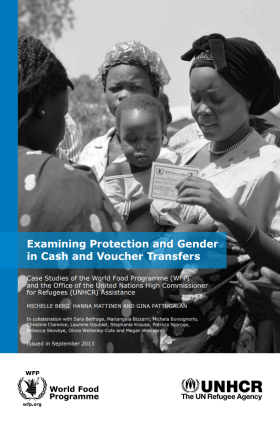
Examining Protection and Gender in Cash and Voucher Transfers
Case Study
With cash and voucher transfers increasing as a form of humanitarian assistance, the World Food Programme (WFP) and the UN Refugee Agency (UNHCR) teamed up to study the potential protection and gender impact of such transfers. While much research had been done about economic and market impacts of cash and...

Guidelines for Public Works Programmes: Cash‐, Voucher‐ and Food-for‐Work
Guidelines and Tools
The Food and Agriculture Organization of the United Nations (FAO) manages public works programmes to provide transfers to vulnerable, food-insecure and/or crisis-affected households in return for the provision of labour (particularly through labour-intensive construction and...
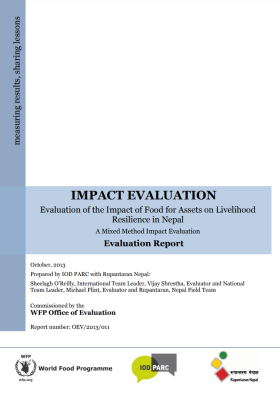
Impact Evaluation: Evaluation of the impact of food for assets on livelihood resilience in Nepal
Report
This evaluation, conducted by an independent team between January and July 2013, assessed the outcomes and impacts of the food-for-assets (FFA) components of two WFP programmes in Nepal: country programme (CP) 100930 (2002–2007) and protracted relief and recovery operation (PRRO) 106760 (2007–2010)....
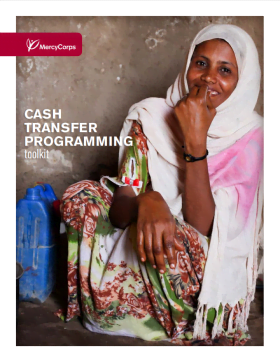
Cash Transfer Programming Toolkit
Guidelines and Tools
The Cash Transfer Programming (CTP) Toolkit is a basic guide to cash transfer programming in emergency response and early recovery settings. The publication is based upon best practiced and practical experience from Mercy Corps programmes. The Toolkit provides general guidance for CTP, as well as...

Impact Evaluation of Cash and Food Transfers for the Seasonal Emergency Safety Net in Hajjah and Ibb Governorates, Yemen Endline Report
Report
This report is the final impact evaluation of the World Food Programme’s Cash and Food transfer program in Yemen. The program operated in Hajjah and Ibb governorates within the larger Emergency Safety Net (ESN), which provides assistance to qualifying households in rural Yemen. The report details the...
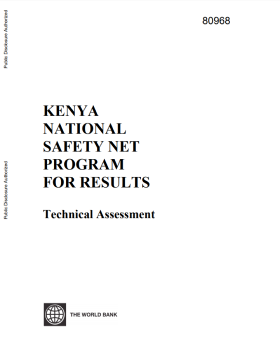
Technical Assessment of the Kenya National Safety Net Program for Results
Report
One of the priorities outlined in the National Social Protection Policy (NSPP) in Kenya, is the government’s ambition to enhance social assistance by developing the necessary institutions and strengthening operational systems while expanding the coverage of such programmes. To help realise this policy...

Women’s Empowerment and Nutrition: An Evidence Review
Report
This paper starts by reflecting on the concept and measurement of women’s empowerment and then reviews some of the structural interventions that aim to influence underlying gender norms in society and eradicate gender discrimination. It then proceeds to review the evidence of the impact of three types...

Building Women’s Economic and Social Empowerment Through Enterprise: An experimental assessment of the Women’s Income Generating Support (WINGS) program in Uganda
Report
Investing in women is said to be a key to development. Educate her, buy her a cow or goat, or help her start a business and great things will follow: sustained increases in income, greater empowerment and social inclusion, health and education for the children, and (especially in war-affected regions)...
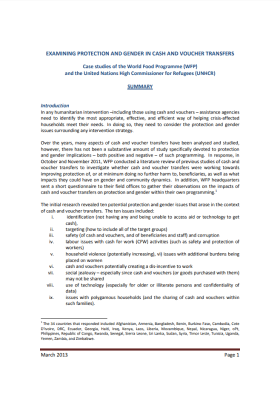
Examining Protection and Gender in Cash and Voucher Transfers – Summary
Report
In any humanitarian intervention – including those using cash and vouchers – assistance agencies need to identify the most appropriate, effective, and efficient way of helping crisis-affected households meet their needs. In doing so, they need to consider the protection and gender issues surrounding...

The Effect of Cash, Vouchers and Food Transfers on Intimate Partner Violence: Evidence from a randomized experiment in Northern Ecuador
Report
Despite the pervasive and far reaching consequences of intimate partner violence (IPV), there is little conclusive evidence on policy instruments to reduce or prevent violence. Using a randomized experiment in Northern Ecuador, this study provides evidence on whether cash, vouchers and food transfers...
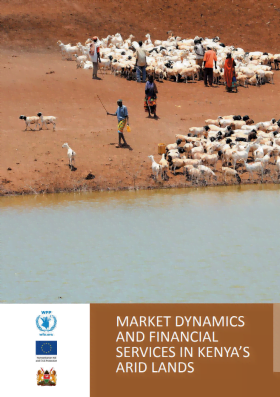
Markets dynamics and financial services in Kenya’s Arid and Semi-Arid Lands
Guidelines and Tools
The Vulnerability Analysis and Mapping (VAM) team of WFP recently finalised a market study on the Arid and Semi-Arid Lands (ASALs) of Kenya. The study explores market dynamics and financial service access for pastoral communities. This executive summary shortly presents the findings of this study. The...

Gatekeepers in Mogadishu: Research Consultancy
Report
Since 2011 the Somalia Cash Consortium has been implementing large-scale unconditional cash transfers (UCTs) under the Food Assistance to Vulnerable Households in South Central Somalia. Members of the Consortium have been confronted with the challenge of having to negotiate security and access to IDP...
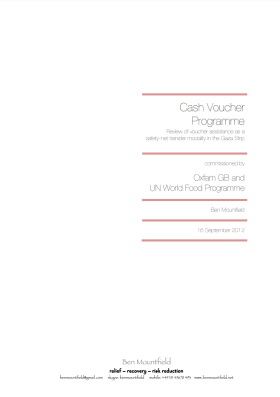
Cash Voucher Programme: Review of voucher assistance as a safety-net transfer modality in the Gaza Strip
Report
This review commissioned by Oxfam GB and WFP, looks at the effect of the Cash Voucher Project of WFP / Oxfam / Ma’an (CVP) on beneficiaries in Gaza. The review studies the impact on beneficiary diets and interviews beneficiaries to obtain their opinion on cash vouchers over in-kind food aid. The review...

An Innovative way of Humanitarian Assistance using Mobile Money Transfer in Bangladesh
Presentation
A video detailing Oxfam’s use of mobile money transfer in Bangladesh.
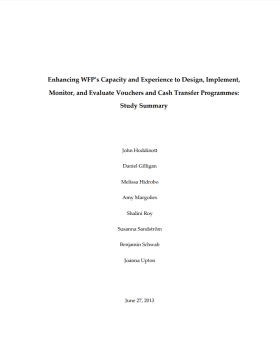
Enhancing WFP’s Capacity and Experience to Design, Implement, Monitor, and Evaluate Vouchers and Cash Transfer Programmes: Study summary
Report
With support from the Government of Spain, and in partnership with the World Food Programme (WFP), researchers from the International Food Policy Research Institute (IFPRI) evaluated four pilot projects to assess the comparative performance of cash transfers, food payments, and vouchers on household food...
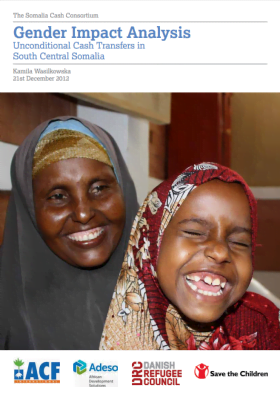
Gender Impact Analysis: Unconditional cash transfers in South Central Somalia
Case Study
The Cash Consortium is a group of four NGOs (ACF, Adeso, DRC and Save the Children) that came together in mid-2011 to coordinate their aid response and use unconditional cash grants to meet the basic food and non-food needs of the most vulnerable households in South Central Somalia. The primary objective...
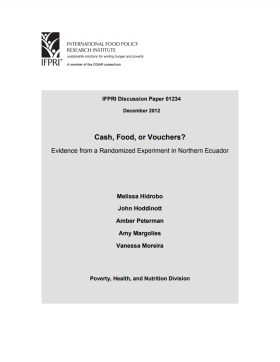
Cash, Food, or Vouchers? Evidence from a randomized experiment in Northern Ecuador
Report
The debate over whether to provide food assistance and the form that this assistance should take has a long history in economics. Despite the ongoing debate, little rigorous evidence exists that compares food assistance in the form of cash versus in-kind. This paper uses a randomized evaluation in...
